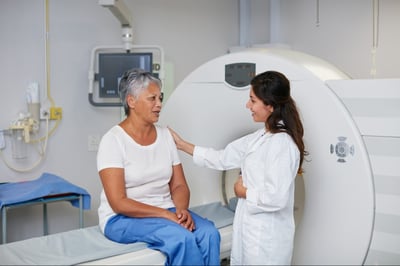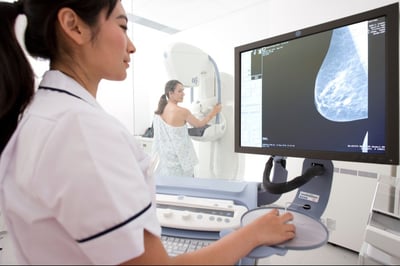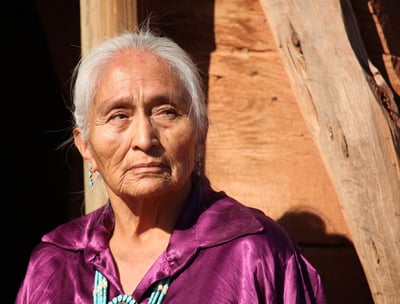FORCE's eXamining the Relevance of Articles for You (XRAY) program looks behind the headlines of cancer news to help you understand what the research means for you.
XRAY is a reliable source of hereditary cancer research-related news and information.
Learn more about the XRAY program
In portal: Breast Cancer, Categories Screening
Relevance: Medium-High


Strength of Science: Medium-High


Research Timeline: Human Research


Study : Yearly breast MRI screening improves outcomes for women with inherited BRCA mutations
Relevance: Medium-High


Strength of Science: Medium-High


Research Timeline: Human Research


Most relevant for: People with a BRCA1 or BRCA2 mutation who are considering breast MRI screening
An international research study of yearly breast MRI screening among women with BRCA1 and BRCA2 gene mutations found that BRCA1 carriers who had MRI screenings were less likely to die of breast cancer than those who did not. Additional studies with more BRCA2 mutation carriers are needed to determine if yearly breast MRIs reduce deaths from breast cancer in this group. (Posted 6/24/24)
Read More
Relevance: High


Strength of Science: High


Research Timeline: Post Approval


Study : Genetic testing among people with cancer can find mutations that may affect treatment and prevention
Relevance: High


Strength of Science: High


Research Timeline: Post Approval


Most relevant for: People diagnosed with cancer who have not yet had genetic testing
Despite national guidelines recommending genetic testing, less than 10 percent of eligible patients had genetic testing within two years after their cancer diagnosis. Among those who had testing, 10-30 percent had an inherited mutation that could affect their medical care. (Posted 3/15/2024)
Read More
Relevance: Medium


Update : News from the FDA– new breast cancer treatment, thermography warning and implant screening updates
Relevance: Medium


Most relevant for: People with HR-positive and HER2-negative metastatic breast cancer. People with silicone breast implants. People considering thermography screening
This XRAY review is a summary of FDA breast cancer updates from July to December 2023. This includes a new drug approval and two consumer updates. (Posted 2/21/24)
Read More
Relevance: Medium


Article : Breast cancer risk for transgender women with inherited mutations
Relevance: Medium


Most relevant for: Transgender women with inherited mutations who are considering or have had gender affirming care
There has been little research on breast cancer risk for transgender women who are at high risk for breast cancer due to an inherited mutation. This review summarizes what we know. (Posted 11/29/23)
Este artículo está disponible en español.
Read More
Article : Artificial intelligence (AI) may find breast cancer on mammograms sooner
Most relevant for: People interested in the use of artificial intelligence in medicine
Artificial intelligence (AI) tools may help doctors read mammograms. This assistance may lead to earlier diagnoses of breast cancer. (Posted 9/29/23)
Este artículo está disponible en español.
Read More
Relevance: Medium-High


Guideline : What is breast density and why does it matter?
Relevance: Medium-High


Most relevant for: People who have mammograms
New FDA guidelines for mammograms will go into effect by September 2024. Current FDA guidance requires hospitals and breast centers to give people information about their breast density with their mammogram results. By September 2024, mammogram providers will need to relay to patients who have dense breast that they should discuss the need for additional imaging. This article provides an overview of what breast density means and why it matters. (Posted 6/8/23)
Este artículo está disponible en español.
Read More
Article : A food lover’s decision to remove her stomach highlights difficult decisions around cancer risk
Most relevant for: People with a CDH1 mutation or a family history of stomach cancer
National Public Radio reporter Sáša Woodruff shares her story of learning about her CDH1 mutation and making a decision about risk-reducing surgery. Mutations in the CDH1 gene significantly increase a person’s risk of stomach and breast cancers. Woodruff’s personal essay describes the psychological challenge of making decisions about risk-reducing surgeries and draws attention to a lesser-known mutation linked to hereditary cancer. (Posted 5/17/23)
Este artículo está disponible en español.
Read More
Topic : Cancer disparities in American Indian and Alaska Native populations
Most relevant for: Americans Indians and Alaska Natives
The American Cancer Society released a special section in their 2022 Cancer Facts & Figures report that discussed cancer disparities in American Indian and Alaska Native populations in the United States. This review highlights the special section’s main points, including disparities in cancer screening, diagnosis and survival rates in native communities, as well as factors contributing to those disparities. (Posted 12/20/22)
Este artículo está disponible en español.
Read More
Article : Breast cancer risk for transgender men with inherited mutations
Most relevant for: Transgender men with an inherited mutation
There is little information related to the risks and treatment options for transgender men and nonbinary people who are at high-risk for breast cancer due to an inherited BRCA1 or BRCA2 mutation. We review an expert viewpoint on the implications of a BRCA mutation for transgender men undergoing breast removal as part of their gender-affirming care plan. (posted 5/19/22)
Este artículo está disponible en español.
Read More
Relevance: Medium-High


Strength of Science: Medium-High


Research Timeline: Post Approval


Study : New tool to predict breast cancer risk for Black women
Relevance: Medium-High


Strength of Science: Medium-High


Research Timeline: Post Approval


Most relevant for: Black women in the U.S.
An important part of making decisions about breast cancer screening and prevention is knowing your breast cancer risk. Specific tools are used to identify people who would benefit from early and/or additional screening and chemoprevention or those who would most benefit from genetic counseling and testing. Because these tools were developed using data mostly from white women, they are unable to predict cancer risk as well for Black women. To begin to address these gaps, researchers developed a new tool specifically designed to predict breast cancer risk for Black women. This tool has been shown to work well, especially for younger Black women. (posted 3/22/2022) Este artículo está disponible en español.
Read More